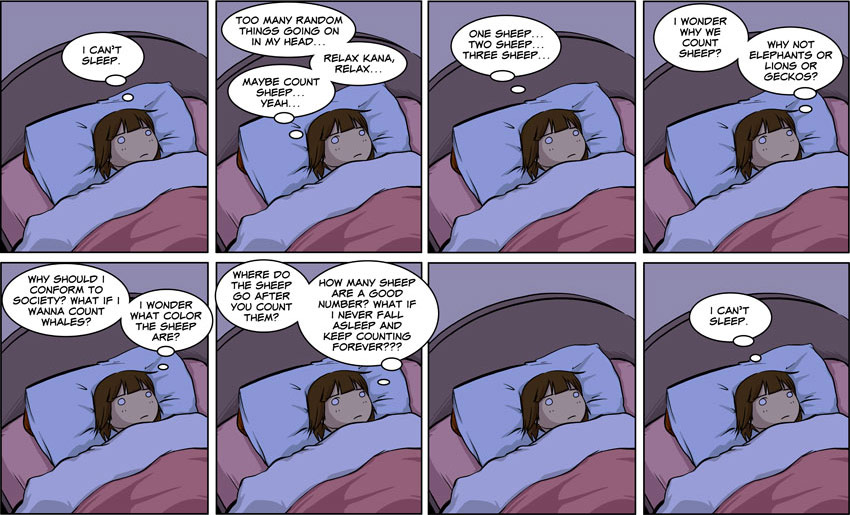Have you ever been relaxing on the couch and find yourself falling asleep only to get to bed and feel wide awake? Have you ever wanted to sleep but could not turn your mind off? If so, you’re not alone! It is a fairly common experience to have your mind feel full of thoughts when we go to bed.

A Few Sleep Hygiene Suggestions
In order to set yourself up for success, it may be important to use a few straightforward tips to help you prepare for sleep:
- In the past there has been an emphasis on going to bed and getting up at the same time every day. More recently, however, research appears to point to getting up at the same time everyday and then going to bed when your body says it is tired as more important.
- Pay attention to how much caffeine you consume and at what time of day you consume it. Alcohol consumption can also impair quality sleep.
- Maintain a room that is conducive to sleep: a cool, dark room with a bed that you find comfortable. Consider removing things that detract from relaxing (this could be a smart phone, television, a noisy ticking clock, etc.)
- Reduce exposure to bright lights in the evening. For this you might consider using lamps rather than bright overhead lights and reduce the brightness levels if you use a laptop or phone in the evening.
- Take care of your physical and mental health. There is often a clear relationship between sleep and our physical/mental health. If one improves, the other might as well!
Tips for Calming Your Mind
Sometimes when we find our mind racing in bed it is because we have not had a chance to just sit and think during the day and our mind is trying to make up for it! Consider setting time aside during the day where you give yourself permission to sit and think (or worry). Limit this time to a set amount of minutes (perhaps 10-15) and when that time is up, allow your mind to return to other thoughts.
If you find your mind returning to stressful or anxiety-provoking topics while trying to sleep, you might find it useful to intentionally use distraction (e.g. get up and do something else for a period of time, focus on innocuous topics such as saying the alphabet backwards). If you find your mind wandering back to the stressful topics, gently (without criticizing yourself) bring your mind back to the innocuous topic. If there is a something that bothers you that keeps coming up over and over, remind yourself that nighttime is most likely not the best time to try to remedy a concern. Perhaps write out what is bothering you (which in itself might help calm your mind) and then revisit the subject the next day when you might be better able to address it.
Relaxation exercises which engage both the body and the mind are also a nice way to facilitate sleep and tone down unwanted thoughts. One example might be progressive muscle relaxation where you would go through different muscle groups in your body and focus on tensing and relaxing them. I recommend checking out YouTube videos (there are many!) for one you like to help you practice a few times before integrating it into your sleep routine.
Reducing the Pressure to Sleep
The more we push ourselves to sleep, the more we tend to panic about how little sleep we’re going to get. And the more we panic, the less likely our Nervous System is to relax enough that we can sleep. Here are two suggestions for reducing the pressure to sleep:
- Do not look at the clock. No matter what time it is, knowing the numbers will not make it easier to sleep. If anything, it will increase panic as you calculate the number of hours until you have to get up. An idea is to set an alarm so when you do have to start to get ready, you will know – and then put away anything that displays the time. This suggestion can be one of the more difficult and yet more effective ones out there!
- Monitor the thoughts you are having around the need to go to sleep. If you find your thoughts becoming catastrophic (e.g. if I do not go to sleep right now I will not function at all tomorrow!), check in with a more realistic evaluation of the situation. Chances are, if you do not get enough sleep one night, you might be tired the next day but we can often function adequately. The risk of catastrophic thinking is that it can set up a pattern of predicting that we will not sleep well which will increase our anxiety levels which might then turn into many nights of insomnia (which might actually start to impede functioning in a more significant way).
For more information about how to get the best sleep, check out The Insomnia Workbook: A Comprehensive Guide to Getting the Sleep You Need by Stephanie Silberman and Charles Morin.
